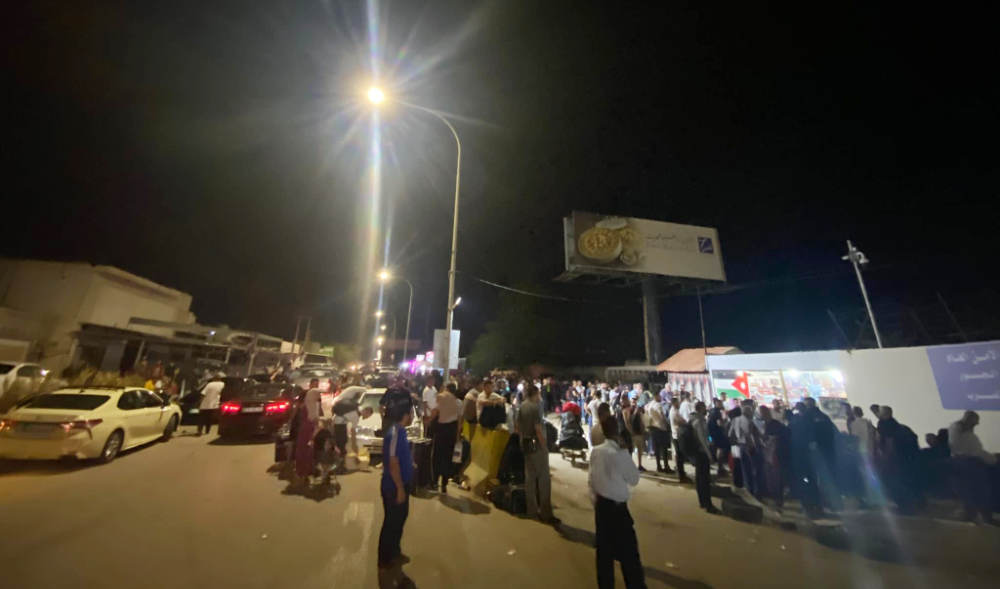RAMALLAH: Palestinians traveling from and through Jordan to the West Bank via an Israeli crossing are experiencing long delays and overcrowding.
The Palestinians, who do not have an airport, are forced to travel through Queen Alia International Airport in Jordan.
Nearly 3.5 million Palestinians travel from the West Bank through Jordan in a year.
According to Palestinian sources, about 7,000 passengers cross daily from Jordan to the West Bank and from the West Bank through Jordan, reaching up to 10,000 passengers per day on holidays.
The crossings, which are controlled by Israeli authorities, open for 13 hours daily and for five hours on Fridays and Saturdays, contributing to the overcrowding.
Thousands of Palestinians who live abroad and have not been able to visit their families in the West Bank during the past three years due to COVID-19 restrictions have decided to travel this summer, adding pressure to the overcrowding.
The US and Morocco mediated with Israel to open the crossings around the clock, and Israel said it agreed but needed to prepare the logistics by the end of September. But Palestinian sources told Arab News that they had not yet received any notification about such a possibility.
Passenger anger was expressed on social media.
BACKGROUND
A senior official at the Palestinian General Administration for Borders and Crossings said that the Palestinian crossings were witnessing unprecedented overcrowding due to the holidays, the return of pilgrims, and the arrival of citizens after a three-year hiatus due to coronavirus.
Abu Adam Al-Khalili wrote on the King Hussein Bridge Facebook page on Friday: “The King Hussein Bridge problem is that there is no will to improve people's travel. The system that has existed for 30 years is the same.”
Bilal Abed wrote: “It is now 3 a.m., and there is heavy congestion on the Jordan Bridge departing to the West Bank. To those whose travel is not obligatory, please postpone your travel until tomorrow or the day after tomorrow.”
One of the passengers waiting on the Jordanian side reported on Facebook that the bridge, which links the Palestinian territories in Jordan, would receive passengers 24 hours a day, seven days a week, starting at the end of September. But, a short time later, Khadija Al-Ghorani replied: “The decision must be immediate and not for September because the crisis these days is stifling.”
A woman who identified herself as Um Moataz Mustafa wrote on Saturday morning: “We demand that the bridge be opened 24 hours to solve the overcrowding. Oh, officials, make things easy for travelers because they are humans, not animals. Travel to the North and South Poles is easier than passing over the bridge. Why, officials?”
The Jordanian side calls the bridge at its border crossing — 2 kilometers east of the Jordan River — the King Hussein Bridge.
The Israelis call their crossing — 500 meters west of the Jordan River — the Allenby Crossing.
But Palestinians call both of them the Dignity Crossing, a reference to a 1968 battle that saw the first armed military clash between Israel and Palestinian fighters and the Jordanian army. Israel occupied the West Bank the previous year.
Angry travelers said on social media that it was a crossing of humiliation, not dignity.
The King Hussein Bridge is located in the Jordan Valley, more than 300 meters below sea level.
The summer temperatures in that area peak at 45 degrees Celsius, with children, the elderly, and the sick suffering more while waiting for long hours in the blazing sun.
Ahmed Amer, one of the service drivers on the King Hussein Bridge, told Arab News that he had seen more than 2,000 passengers spending the night waiting in front of the bridge gate until 7 a.m. — its opening time — waiting to leave for the West Bank.
He added that the VIP crossing — where each passenger paid between an extra $110 to $200 to cross — was also crowded with 1,600 passengers.
Amer estimated the number of passengers crossing toward the West Bank daily as between 5,000 and 7,000.
“Hundreds of travelers have spent two nights sleeping in front of the bridge gate, waiting to be able to travel to the West Bank,” Amer told Arab News, noting that the temperature in that area reached 45 degrees Celsius in the middle of the day.
He said the morning hours were overcrowded as thousands tried to enter the West Bank.
A senior Palestinian official at the Palestinian General Administration for Borders and Crossings told Arab News that the Palestinian crossings were witnessing unprecedented overcrowding due to the holidays, the return of pilgrims, and the arrival of citizens after a three-year hiatus due to coronavirus.
He said the Palestinian side had made efforts with all relevant parties, meaning Jordan and Israel, to alleviate the problem and the severity of the crisis.
He added there was international interest from the US and Europe in facilitating the movement of Palestinian citizens through the crossings to and from Jordan.
Palestinian officials are aware of the passenger crisis and are trying to solve it quietly with their Jordanian counterparts, avoiding any media statement that could anger them.
A senior Palestinian official told Arab News that the Palestinian Authority's Foreign Affairs Minister Riad Malki had been tasked by the prime minister to contact the Jordanians to overcome the problem.























